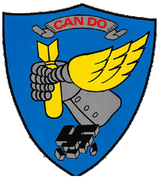305th Bombardment Group
| 305th Operations Group | |
|---|---|

Grou0p KC-10 Extender after receiving fuel from a KC-135 Stratotanker over Afghanistan
|
|
| Active | 1942–1946; 1947–1948; 1950–1952; 1991–1993; 1994–present |
| Country |
|
| Branch |
|
| Role | Airlift and Air Refueling |
| Part of | Air Mobility Command |
| Garrison/HQ | Joint Base McGuire-Dix-Lakehurst |
| Motto(s) | Can Do |
| Engagements | European Theater of Operations |
| Decorations |
Distinguished Unit Citation Air Force Outstanding Unit Award |
| Commanders | |
| Notable commanders |
Curtis LeMay |
| Insignia | |
| 305 Operations Gp emblem |  |
| 305th Bombardment Group emblem (approved 23 April 1951) |  |
| 305th Bombardment Group emblem (World War II) |  |
The 305th Operations Group is a United States Air Force unit assigned to the 305th Air Mobility Wing. It is stationed at Joint Base McGuire-Dix-Lakehurst, New Jersey.
During World War II, the group's predecessor unit, the 305th Bombardment Group was one of the first VIII Bomber Command Boeing B-17 Flying Fortress units in England, and, was one of the most-decorated USAAF heavy-bombardment groups in the European Theater. 1st Lt William R. Lawley, Jr. and 1st Lt Edward S. Michael, pilots in the 364th Bomb Squadron, each received the Medal of Honor.
While commanded by Colonel Curtis LeMay the 305th Bomb Group pioneered many bomber flying formations and bombing procedures that became the standard operating procedures in the Eighth Air Force.
The group suffered the heaviest loss of the 14 October 1943 Schweinfurt–Regensburg mission, and for this reason, was given a Nazi flag found flying in the city when it was captured by U.S. troops in April 1945.
The mission of the 305th Operations Group is to deploy worldwide from Air Mobility Command's Eastern Gateway, Joint Base McGuire-Dix-Lakehurst (JB MDL), to perform aerial-refueling and airlift missions, in support of tactical, strategic, reconnaissance, transport, and bombardment forces in high-threat and chemical-warfare environments.
The group flies the C-17 Globemaster III and KC-10 Extender in support of worldwide operations.
The group comprises the following squadrons:
The 305th Bombardment Group was activated 1 March 1942 at Salt Lake City Army Air Base, Utah. The unit trained there before moving to Geiger Field, Washington on 11 June 1942. Received intensive training at Muroc Army Air Field, California beginning in July 1942.
...
Wikipedia
